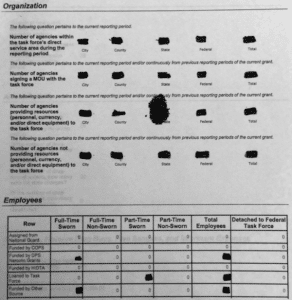On May 20, 2015, Show-Me Cannabis announced the latest in a series of lawsuits aimed at ensuring that Missouri’s multi-jurisdictional drug task forces must obey state laws that require transparency and accountability to the people. The case targets the MUSTANG Task Force, headquartered in Cole County and also operating in Boone, Callaway, and Cooper Counties, for its ongoing, unlawful refusal to properly respond to requests for open public records.
The records the Show-Me Cannabis requested included quarterly reports the task force is required to make to the Missouri Department of Safety; MUSTANG produced those documents but unlawfully redacted parts of them without identifying any statute authorizing the redactions. Show-Me Cannabis also requested minutes of public meetings of the Task Force’s Oversight Board as well as copies of the Memorandum of Understanding signed by participating members of the Task Force – all of which is, by definition, information open to the public.
 Missouri’s open records law requires a custodian of records to provide an appropriate response within three days of receiving a request. Callaway County Sheriff Dennis Crane, however, simply ignored the requests, even after Show-Me Cannabis sent him a letter pointing out the statutory provisions that required Crane to respond. Ultimately, Show-Me Cannabis had no choice but to sue Crane and the MUSTANG Task Force to force them to obey state law.
Missouri’s open records law requires a custodian of records to provide an appropriate response within three days of receiving a request. Callaway County Sheriff Dennis Crane, however, simply ignored the requests, even after Show-Me Cannabis sent him a letter pointing out the statutory provisions that required Crane to respond. Ultimately, Show-Me Cannabis had no choice but to sue Crane and the MUSTANG Task Force to force them to obey state law.
After Show-Me Cannabis filed the lawsuit, Crane told The Fulton Sun that he had given the group everything MUSTANG could, suggesting that any response to the requests described above would reveal active “undercover operations.”
“That’s completely false and Sheriff Crane has to know it,” said Aaron Malin, the director of research for Show-Me Cannabis and a plaintiff in this case. “We requested a lot of information that could not have much, if anything, to do with open cases or active investigations. Even if the documents had some sensitive information, which I doubt, the Sunshine Law explicitly requires Sheriff Crane to redact the sensitive information and to produce the documents anyway.”
Dave Roland, the attorney who filed the case on behalf of Malin and Show-Me Cannabis, explained further:
“If Sheriff Crane thought that a statute allowed part of the requested records to be redacted, his responsibility was to identify which specific statutes authorize the redactions, to make the redactions, and to provide the documents. But he didn’t do that. Even after being reminded of his statutory responsibility to respond to Sunshine Law requests – and the penalty for failing to do so – Crane chose to directly disobey the law’s requirements.”
Like so many other task force officers, Sheriff Crane seems to think that he is above the law – and that is why Show-Me Cannabis’s strategic litigation is so important. The Sunshine Law litigation campaign is designed to have courts firmly establish that law enforcement officials cannot exempt themselves from the laws citizens have put in place to require transparency and accountability. These task force officers may mislead the media about our Sunshine Law requests and the task forces’ own legal responsibilities, but judges who know the laws will not be fooled. We are fighting these battles so that, in the end, any task force official who continues to insist that they are above the law will be exposed and penalized.
—-
Litigation is expensive, and most of the task forces and their attorneys think they can win simply by filing numerous frivolous motions that might make it too expensive for us to continue fighting. Please consider making a tax-deductible contribution to ensure we can continue holding drug task forces accountable to the law.
Source: Show-Me Cannabis





